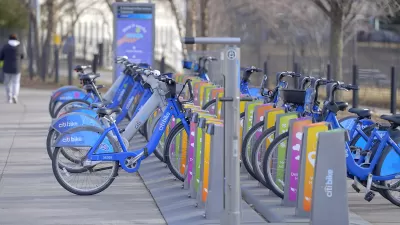With bicycling growing in popularity while driving decreases, should a city install "bicycle-specific traffic signals"? Mary Ebeling of State Smart Transportation Initiatives provides guidance and helpful designs from city transportation officials.
Bike traffic signals accommodate cyclists better than conventional traffic signals. Providing sufficient time to clear the intersection, ensuring activation of the traffic signal, and reducing conflict with motorized traffic are some of the benefits.
Mary Ebeling writes that "(w)hile widely used in Europe and Australia, the U.S has been slow to adopt bicycle-specific traffic signals. Currently 16 cities (including Austin, Denver, Minneapolis, San Francisco, Seattle and Washington D.C) in the U.S. use bicycle-specific traffic signals."
So, what's holding them up?
A major hurdle lies with the fact that they are not incorportated into the federal Manual on Uniform Traffic Control Devices (MUTCD). However, states can authorize them on their own - and the National Association of City Transportation Officials (NACTO) has provided detailed information and guidance for appropriate locations to install bicycle signal heads.
"California relied on data from the bicycle-friendly city of Davs and approved their use in 1998. The State of California approved the use of bicycle traffic signals in 1998, based primarily on data from the City of Davis, California
"The State Smart Transportation Initiative, housed at the University of Wisconsin, promotes transportation practices that advance environmental sustainability and equitable economic development, while maintaining high standards of governmental efficiency and transparency."
Tracy Loew and Elida S. Perez, reporters for USA TODAY, write about an "October, 2012 study commissioned by the Oregon Department of Transportation and the Federal Highway Administration. Last year Oregon lawmakers approved Senate Bill 130, adding bicycle-only signals to the state's list of traffic control devices."
"Chicago officials announced the city's first bicycle-specific traffic signal in August. Atlanta got its first bike signal in October.
The bicycle signal cost $1,000 to install in Salem, OR, according to assistant city traffic manager Tony Martin."
FULL STORY: Increasing bicycle mode share leads to growing need for bicycle-specific traffic signals

Maui's Vacation Rental Debate Turns Ugly
Verbal attacks, misinformation campaigns and fistfights plague a high-stakes debate to convert thousands of vacation rentals into long-term housing.

Planetizen Federal Action Tracker
A weekly monitor of how Trump’s orders and actions are impacting planners and planning in America.

San Francisco Suspends Traffic Calming Amidst Record Deaths
Citing “a challenging fiscal landscape,” the city will cease the program on the heels of 42 traffic deaths, including 24 pedestrians.

Defunct Pittsburgh Power Plant to Become Residential Tower
A decommissioned steam heat plant will be redeveloped into almost 100 affordable housing units.

Trump Prompts Restructuring of Transportation Research Board in “Unprecedented Overreach”
The TRB has eliminated more than half of its committees including those focused on climate, equity, and cities.

Amtrak Rolls Out New Orleans to Alabama “Mardi Gras” Train
The new service will operate morning and evening departures between Mobile and New Orleans.
Urban Design for Planners 1: Software Tools
This six-course series explores essential urban design concepts using open source software and equips planners with the tools they need to participate fully in the urban design process.
Planning for Universal Design
Learn the tools for implementing Universal Design in planning regulations.
Heyer Gruel & Associates PA
JM Goldson LLC
Custer County Colorado
City of Camden Redevelopment Agency
City of Astoria
Transportation Research & Education Center (TREC) at Portland State University
Jefferson Parish Government
Camden Redevelopment Agency
City of Claremont





























